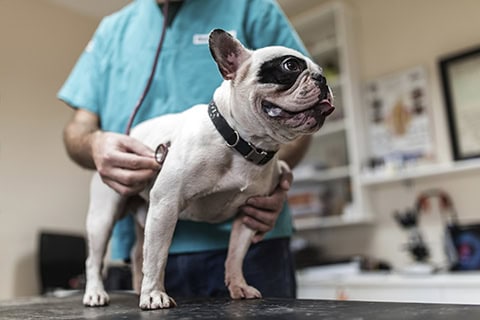Human Medications: Common Culprits of Pet Poisonings
 Certain pharmaceuticals have the potential to bring us great relief. From headaches and allergies to congestion and depression, human medications ease symptoms and eliminate pain. But when half of all pet poisonings are related to them, it’s time for drastic measures to protect your pet.
Certain pharmaceuticals have the potential to bring us great relief. From headaches and allergies to congestion and depression, human medications ease symptoms and eliminate pain. But when half of all pet poisonings are related to them, it’s time for drastic measures to protect your pet.
Script or Not
Prescription medications aren’t necessarily more toxic to pets than over-the-counter ones. The basic rule to prevent pet poisonings is to keep pets and all medications separated. Some animals will tip over a bottle and try out the flavor of whatever spilled out. Others might sniff out the trash and find discarded medication. Please take extra measures to ensure that your curious or bored pet doesn’t ingest human medications.
Here are some tips:
- Keep medication in its original container. If you use a weekly pill box, ensure each lid is secured and place behind a closed cabinet door.
- Never leave pills in a plastic zip bag; pets can easily chew through these if they think the contents are desirable enough.
- Keep human medications in a different place than any pet medication.
- Hang purses, satchels, or briefcases off the floor (preferably behind a closet door).
Some are Safe?
It’s true, there are several human medications that can be administered to pets (and they are not listed below). However, under no circumstances should pet owners use these without veterinary attention. We strongly encourage you to check with us before taking your pet’s delicate health or medical condition into your own hands; the consequences can be fatal.
Responsible for Pet Poisonings
Below are the most dangerous human medications that result in pet poisonings across the country:
- Non-steroidal anti-inflammatories (NSAIDs) – Also known as ibuprofen (Advil, Motrin) and naproxen (Aleve), cats, dogs, and pocket pets should never have access to these drugs, which can result in kidney failure and ulcers.
- Acetaminophen – Tylenol is the brand name for this type of human drug that should never be given to pets. Red blood cell damage and liver failure can result.
- Sleep aids – Brands like Lunesta, Ambien, Xanax, and Klonopin cause significant agitation, respiration changes, and even liver failure.
- Antidepressants – Not surprisingly, these types of human drugs interfere with neurological responses, but they can also have stimulating effects. It’s been noted that the taste of certain antidepressants attracts pets.
Other Common Culprits
Rounding out the list of human medications responsible for pet poisonings include pills for ADD or ADHD, birth control pills, high blood pressure medications, thyroid hormones, and cholesterol pills. Herbal medications should also be stored securely.
It’s not uncommon for pet owners to erroneously assume that medication intended for children is safe for pets. It’s not always a dosage issue. Instead, it’s the chemical makeup of the medication, your pet’s metabolism, and weight that are the key factors.
Don’t Hesitate
Pet poisonings are real emergencies. Please do not wait to see how your pet will react given more time. Every passing minute counts, and we urge you to contact us as soon as you know or suspect your pet is in trouble. The Pet Poison Helpline is also available 24 hours a day at 1-800-213-6680 to help with any urgent questions or concerns.

